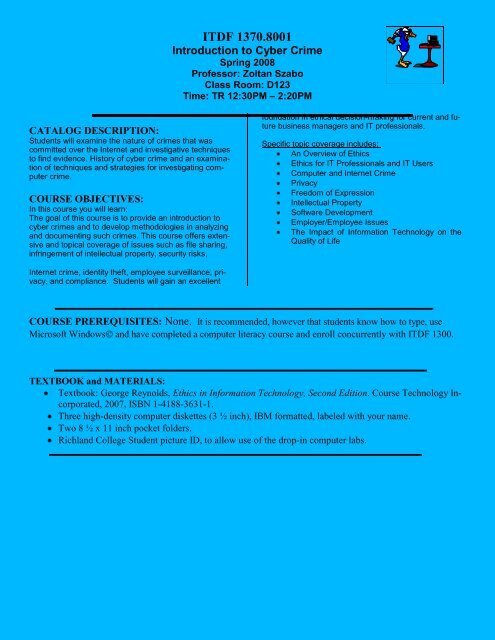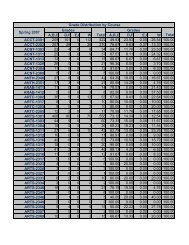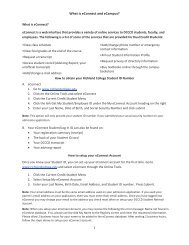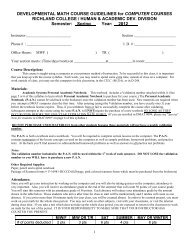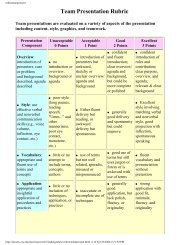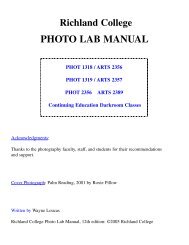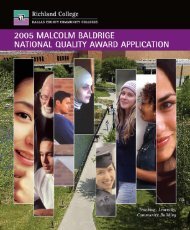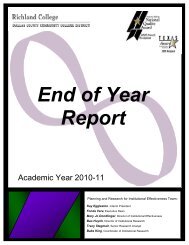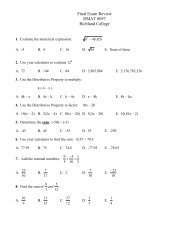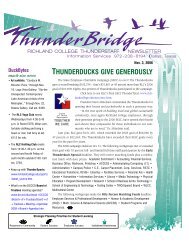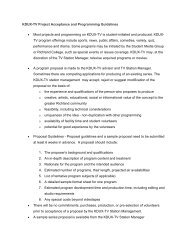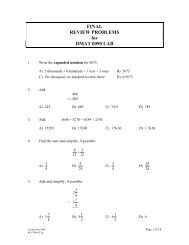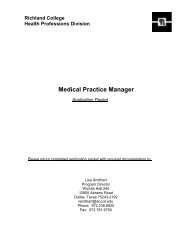Sample Syllabus - Richland College
Sample Syllabus - Richland College
Sample Syllabus - Richland College
You also want an ePaper? Increase the reach of your titles
YUMPU automatically turns print PDFs into web optimized ePapers that Google loves.
ITDF 1370.8001Introduction to Cyber CrimeSpring 2008Professor: Zoltan SzaboClass Room: D123Time: TR 12:30PM – 2:20PMCATALOG DESCRIPTION:Students will examine the nature of crimes that wascommitted over the Internet and investigative techniquesto find evidence. History of cyber crime and an examinationof techniques and strategies for investigating computercrime.COURSE OBJECTIVES:In this course you will learn:The goal of this course is to provide an introduction tocyber crimes and to develop methodologies in analyzingand documenting such crimes. This course offers extensiveand topical coverage of issues such as file sharing,infringement of intellectual property, security risks,foundation in ethical decision-making for current and futurebusiness managers and IT professionals.Specific topic coverage includes:An Overview of EthicsEthics for IT Professionals and IT UsersComputer and Internet CrimePrivacyFreedom of ExpressionIntellectual PropertySoftware DevelopmentEmployer/Employee IssuesThe Impact of Information Technology on theQuality of LifeInternet crime, identity theft, employee surveillance, privacy,and compliance. Students will gain an excellentCOURSE PREREQUISITES: None. It is recommended, however that students know how to type, useMicrosoft Windows and have completed a computer literacy course and enroll concurrently with ITDF 1300.TEXTBOOK and MATERIALS:Textbook: George Reynolds, Ethics in Information Technology, Second Edition. Course Technology Incorporated,2007, ISBN 1-4188-3631-1.Three high-density computer diskettes (3 ½ inch), IBM formatted, labeled with your name.Two 8 ½ x 11 inch pocket folders.<strong>Richland</strong> <strong>College</strong> Student picture ID, to allow use of the drop-in computer labs.
SCANS COMPETENCIES (Secretary’s Commission of Achieving Necessary Skills)Foundation Skills● Read, write, perform arithmetic and mathematical operations, listen, and speak effectively.● Think creatively, make decisions, solve problems, visualize, know how to learn, and reason effectively.● Display responsibility, self-esteem, sociability, self-management, integrity, and honesty.Workplace Competencies● Identify, organize, plan, and allocate resources effectively.● Acquire and use information.● Work with others effectively.● Understand complex interrelationships.● Work with a variety of technologiesInstitution PoliciesADA statementReligious holidaysAcademic dishonestyWithdrawal policy (withdrop date)Repeating this courseDisclaimer reserving rightto change syllabusIf you are a student with a disability and/or special needs who requiresaccommodations, please contact the college Disability ServicesOffice.Absences for observance of a religious holy day are excused. A studentwhose absence is excused to observe a religious holy day is allowedto take a make-up examination or complete an assignmentwithin a reasonable time after the absence.Scholastic dishonesty is a violation of the Code of Student Conduct.Scholastic dishonesty includes, but is not limited to, cheating on a test,plagiarism, and collusion.As a college student, you are considered a responsible adult. Yourenrollment indicates acceptance of the DCCCD Code of Student Conductpublished in the DCCCD Catalog.https://www1.dcccd.edu/cat0506/ss/code.cfmIf you are unable to complete this course, it is your responsibility towithdraw formally. The withdrawal request must be received in theRegistrar’s Office by (semester’s drop date). Failure to do so will resultin your receiving a performance grade, usually an “F.” If youdrop a class or withdraw from the college before the officialdrop/withdrawal deadline, you will receive a “W” (Withdraw) in eachclass dropped.Effective for Fall Semester 2005, the Dallas County Community <strong>College</strong>swill charge additional tuition to students registering the third orsubsequent time for a course. All third and subsequent attempts ofthe majority of credit and Continuing Education/Workforce Trainingcourses will result in additional tuition to be charged. DevelopmentalStudies and some other courses will not be charged a higher tuitionrate. Third attempts include courses taken at any of the Dallas CountyCommunity <strong>College</strong>s since the Fall 2002 Semester.The instructor reserves the right to amend this syllabus as necessary.ATTENDANCE POLICY: It is expected that students will attend class regularly. Class attendance is 5% ofthe course grade. Students who will be absent from class for the observance of a religious holiday will be allowedto makeup examinations or assignments missed that day IF their instructor was notified not later than the15 th day of the semester. Please refer to the college catalog Student Obligations- Attending Classes section.
WITHDRAWAL: The deadline for receiving a "W" is indicated on the academic calendar and the currentclass schedule. This semester, the drop date is Thursday, April 10. The deadline for dropping without a“W” is Monday, January 28.DISABILITY SERVICES/SPECIAL SERVICES:Student with a disability and/or special needs that requires ADA accommodations should contact the <strong>Richland</strong><strong>College</strong> Disability Services Office, T120, (972) 238-6180.COMPUTER/INTERNET POLICY:<strong>Richland</strong> <strong>College</strong> students, have access to the Del Rio computer labs for educational and instructional purposes.You are required to show your <strong>Richland</strong> Student ID when requested by lab personnel. You are expected tofollow lab policies as well as the Student Code of Conduct specified in the catalog. <strong>Richland</strong> Computer Labcannot provide any software for outside use.https://www1.dcccd.edu/cat0506/ss/computer.cfmTUTORING AND OTHER ASSISTANCE POLICIES:Tutoring is available through the Center for Teaching and Learning Connections ((972) 238-6226, Medina 216)and the Del Rio lab D229 ((972) 238-6317, large counter center of second floor). Generally, one hour per weekis free.SAFETY POLICY: It is important for students to participate in this class in a safe, appropriate manner. Weoccasionally have to step over cords for the multimedia cart and/or computer equipment. We also need to watchout for boxes and paper, students’ backpacks, etc. During the first few labs, you will be encouraged to buildgood computing habits, designed to prevent eyestrain, carpal tunnel syndrome, etc.CAMPUS FOOD AND DRINK POLICY: No eating or drinking is allowed at the computer tables in the labrooms. Students, who wish to eat or drink in the lecture room, must sign the Statement of Responsibility, anagreement to be responsible for removing cans, bottles, and trash, from the learning environment.TESTING: There are two testing elements; short Unit Quizzes and three Major tests. All quizzes and tests willbe Closed Book, unless notified in advance. No make-up quizzes or exams will be given!!!!!!DUE DATES: Unit quizzes for this material will be given during the first ten minutes of a class meeting.DE# indicates the opportunity to present a "Discovery Event" reports for that discovery period.DISCOVERY EVENTS: This involves classroom presentation of any current event related in the IT field to thesubjects learned prior to the upcoming DE. Each student required to choose 2 dates to present 2 independentfindings about new technology, improvement to existing technology or PC component. Each presentation shouldnot exceed 10 minutes and presentation style chosen individually. A written presentation must be handed in byeach student for each presentation to earn a grade. Valued at 10% of the final grade.Important: These requirements are cumulative. There are three scheduled periods, as indicated on theAssignment Schedule, to make up the two DE's. A missed chance for a discovery period is lost and may not berecovered.Project AssignmentsYou will be assigned to a group for the entire semester to select an electronic device and conduct a threat modelingof that device. The project will require to meet with your team mates outside the class or exchange informationelectronically. You are responsible for the assigned portion of the project and you will be graded by your teammembers as well as others in the class.Supplementary information: Available on campus, in D257 computer lab by accessingG:\Data\Szabo\PCHardWare. The folder contains class notes, PowerPoint slides, class announcements, thecourse syllabus, test dates, and other information for the course. Read
GRADING ELEMENTS: FINAL GRADE VALUES A 90 - 100B 80 - 89C 70 - 79D 60 - 69F 59 below1. Attendance 15 %2. Quizzes(project) 40%3. Final Exam 25 %4. DE x 2 20%INSTRUCTOR DATA: Zoltan Szabo Office: (972) 238-6059Office Location: Del Rio Building, D112 E-Mail: zszabo@dcccd.eduOffice Hours:By appointment onlyDivision Office: B101, Phone: 238-6074 Lab: D257; (972) 238-6317COURSE OUTLINE and/or ASSIGNMENT SCHEDULE:LAST DAY TO DROP WITH A ‘‘W’’ Thursday, April 10Topics Home Work NotesWeek 1 January 15, 17IntroductionChapter 1 – An Overview of EthicsWeek 2 January 22, 24Chapter 2 - Ethics for IT Professionals and IT UsersJanuary 24 th – NO CLASSWeek 3 January 29, 31Chapter 3 - Computer and Internet CrimeWeek 4 February 5, 7DE PresentationsWeek 5 February 12, 14Chapter 4 - PrivacyWeek 6 February 19, 21Chapter 5 – Freedom of ExpressionWeek 7 February 26, 28DE PresentationsWeek 8 March 4, 6Chapter 6 - Intellectual PropertyWeek 9 March 11, 13Week 10 March 18, 20Chapter 7 – Software DevelopmentChapter 8 – Employer/Employee IssuesWeek 11 March 25, 27DE PresentationsWeek 12 April 1, 3Chapter 9 – The Impact of Information Technology onthe Quality of LifeDigital Rights Management (DRM)Read CSI/FBI2007 ReportDiscuss RFID andits implications,view RFIDpassport video,Quiz on Ch1Discuss CSI/FBI2007 ReportFeb 5 - DE1Feb 7 - DE2Assign teams forthe ThreatModeling ProjectDistrictconference day –no class Feb 21Spring Break noclass this weekMar 25 - DE3Mar 27 - DE4
Week 13 April 8, 10Federal Information Processing Standards (FIPS)Week 14 April 15, 17Federal Information Processing Standards (FIPS)Week 15 April 22, 24National Institute of Standards and Technology(NIST)Week 16 April 29, May 1National Institute of Standards and Technology(NIST)Finals week,Final May 8ComprehensiveFinalApril 17 - DE5Threat ModelPresentations


